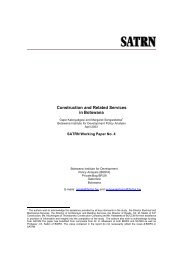Create successful ePaper yourself
Turn your PDF publications into a flip-book with our unique Google optimized e-Paper software.
ICT and education<br />
There is no doubt that ICT is important and can be non-negotiable to a country’s<br />
education system. Rathgeber (200) argue that an illiterate or poorly educated people<br />
cannot wholly absorb ICTs. From this argument, it follows that the country should<br />
afford to introduce ICT in school curriculum so that children learn how to use these<br />
technologies from an early age.<br />
If the whole population can be ICT literate, is the country going to benefit from this?<br />
There is no argument that this could be tabled on the relationship between ICT and<br />
economy. ILO (2001) views ICT as a meta-technology revolving around life at work<br />
in the information economy, characterised by key issues such as change management<br />
practices, the nature of the employment contract, and the quality of work.<br />
The question that has been raised is whether the information economy will be a jobs<br />
economy. Some people would argue that in a highly technological country people jobs<br />
tend to be substituted by technology. Is this true and can this be seed as affecting the<br />
country’s economy negatively? Of course this can result in retrenchment and<br />
unemployment will increase and as a result economic growth will be affected. It could<br />
be argued that technology can also increase the country’s economic growth<br />
There are important lessons to learn the Hawkins (2002) writes and these are vital to<br />
be considered by policy makers, business and community leaders when planning to<br />
incorporate the internet in the educational process. These lessons are :<br />
- Computer Labs in developing countries take time and money, but they<br />
work<br />
- Technical support cannot be overlooked<br />
- Non-competitive telecommunications infrastructure, policies, and<br />
regulations impede connectivity and sustainability<br />
- Lose the wires (basically wireless technology is most effective for<br />
connecting schools in developing countries)<br />
- Get the community involved<br />
- Private-public sector partnerships are essential<br />
- Link ICT and education efforts to broader education reforms<br />
- Training, training, training (Basically that the professional development of<br />
the teachers sits at the heart of any successful technology and education<br />
programme<br />
- Technology empowers girls<br />
- Technology motivates students and energises classrooms<br />
Some of these lessons are important to know, especially if the country is in the<br />
process of implementing ICT curriculum at schools.<br />
ICT and Health<br />
There have been arguments on HIV/AIDS challenges faced by African countries.<br />
Scientists and policy makers argue that people who do not have access to information,<br />
13
















